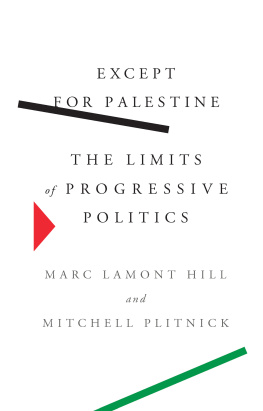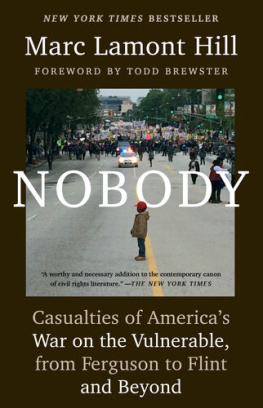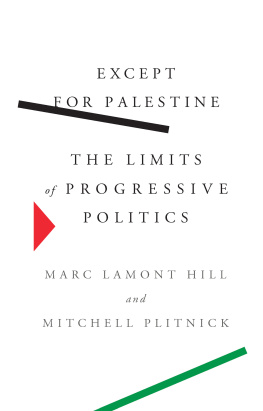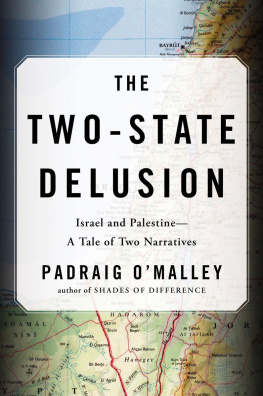Contents
Page List
Guide
EXCEPT FOR PALESTINE
The Limits of Progressive Politics
Marc Lamont Hill and Mitchell Plitnick

To the loving memory of Teo Hunt Surasky, who left this world in 2020 much too soon. And to his mothers, Carolyn Hunt and Cecilie Surasky, who have enriched and strengthened Mitchells life in more ways than they can imagine.
To Ahmed Erekat ( ), a beautiful spirit stolen from the world two weeks before his wedding. May his grave be made spacious, filled with light, and placed in paradise.
), a beautiful spirit stolen from the world two weeks before his wedding. May his grave be made spacious, filled with light, and placed in paradise.
Contents
Preface
As this book was going to press, Joe Biden had just defeated Donald Trump in the 2020 presidential election. Despite Trumps defiant protests to the contrary, Biden garnered a decisive popular and electoral college victory. In doing so, the election effectively ended four years of the greatest corruption, mismanagement, and hateful leadership that the United States had seen in many years.
Still, Bidens victory was a qualified one. Although he lost the popular vote by nearly 6 million votes, Trump still scored the support of more than 73 million Americans, hardly an overwhelming rebuke of his proto-fascist presidency. While significantly better than Trump on several key matters, Biden won by running on a platform that offered no radical vision of the future and promised no fundamental social change. Rather, the Biden presidency promised a return to the status quo ante that proved such fertile ground for Trumps authoritarian hucksterism.
This is not to suggest that Trumps defeat was a small matter. To the contrary, Bidens presidency offered, to borrow a phrase from James Baldwin, a means of buying time. By removing the immediate threat of fascism, white nationalism, and extraordinary incompetence, the American people cleared a little bit of space to better fight the perennial threats of white supremacy, capitalism, and empire.
Embracing such a sober analysis of president-elect Bidens platform enables us to set aside any illusions about the current political moment. We recognize that the effects of Trumps reign will not magically disappear in the wake of the 2020 election. We also understand that President Biden is incapable, and in some cases unwilling, to repair the damage wielded by the previous administration. With such reduced expectations, we have little reason to believe that the Biden presidency will properly attend to the systemic issues that preceded and, indeed, helped produce the Trump phenomenon. This analysis applies not only to domestic matters, but also to U.S. foreign policy.
During the Trump presidency, American policy toward Palestine and Israel dropped all pretense of even-handedness. Many of the normal diplomatic niceties and policy charades deployed by previous presidents were simply abandoned. Trumps agenda was driven openly and unabashedly not just by pro-Israel forces, but by the most radical of those forces: the religious-nationalist settler movement. Trumps administration came together with an Israeli government that had been moving further and further to the right with each election, and a compromised and divided Palestinian leadership consumed by its own internal squabbles over the crumbs of authority Israel tossed it. The purpose of this collaboration was to create a final status solution in the region that forever excluded the possibility of a free, functional, and self-determined Palestinian state that included Palestinian citizens of Israel, residents of the West Bank and Gaza, and those currently living as refugees around the world. Given this relationship, it is no surprise that Israel received many gifts from the United States, including recognition of Western Jerusalem as its capital and Israels annexation of the Golan Heights; a U.S. plan for permanent Israeli control of the West bank dubbed, in the best Orwellian tradition, the Deal of the Century; the ending of funding for basic services to Palestinian refugees; and other large concessions. Even more telling is that the Israeli government was not asked to give anything in return, even as a token exchange.
In the three months prior to the election, as he rushed to score more diplomatic victories, the Trump administration forged agreements for normalization of relations between Israel and Arab states Bahrain, the United Arab Emirates, and Sudan. These agreements often required the forceful stifling of dissent against them. The shift in the United States position and its heavy pressure on Israels behalf made it possible to break that Arab state consensus. In so doing, they further diminished what little bargaining leverage Palestinians had.
President Biden almost certainly would not have made the decisions Trump did, some of which we explore in this book. But as we enter the dawn of his presidency, he has also made it clear that he has no intention of reversing them. Known during his time as vice president as Obamas salesman to the pro-Israel community, Such goals are nearly identical to those of the Barack Obama administration, whose failures occurred before Trump gave Israel all it requested for four years, raising Israeli expectations of Washington and destroying what little Palestinian faith remained in the United States.
This book, written in the age of Trump, carries an even more powerful message as we enter the age of Biden. We must remember that nearly nothing that Trump didas ill-advised, cruel, or reckless as it may have beenwas an original idea. His decisions were all based on long-held policy positions of various sectors within the pro-Israel community. Many were bipartisan, such as the move of the American embassy from Tel Aviv to Jerusalem, which, as we explain in detail, was based on a law passed during the Clinton administration with an overwhelming majority of Democrats and Republicans.
Long before Trump came along, Israels occupation of the West Bank and siege on the Gaza Strip had become a part of the background of the American media landscape. Although it occasionally flared up and appeared in the headlines, it was nonetheless understood as a part of the violent tapestry of daily life in the Middle East. That Orientalist perception, along with the normalization of the occupation and dispossession of the Palestinian people, was cemented within the public imagination during the Obama-Biden years. Those are the good old days to which Biden promises to return us.
In the United States, we are struggling to reckon with a legacy of structural injustice that has defined our history. American policy in Palestine and Israel has always been hopelessly intertwined with our own longstanding struggles with white supremacy, Islamophobia, anti-Semitism, and ethnocentrism. As weve come to understand that racism, sexism, religious bigotry, anti-LGBTQIA hate, and other prejudices are intersectional, we must also recognize how these systems of oppression inform our foreign policy. We cannot truly grapple with our history if we ignore how it has also affected the rest of the world. If we are to adopt a progressive political outlookone rooted in anti-racist, anti-imperialist, humanistic, and intersectional valueswe must begin to prioritize the freedom, dignity, and self-determination of Palestinians.
As with Barack Obamas tenure, we will be tempted to view Palestine through a relative lens during the Biden presidency. Rather than analyzing policies on their own terms, we will feel compelled to compare them to those of his Republican predecessor, just as we did with Obama in relation to George W. Bush. While such an approach can serve as a pragmatic measuring stick, it cannot be permitted to shape our values, nor determine the boundaries of our advocacy.
















 ), a beautiful spirit stolen from the world two weeks before his wedding. May his grave be made spacious, filled with light, and placed in paradise.
), a beautiful spirit stolen from the world two weeks before his wedding. May his grave be made spacious, filled with light, and placed in paradise.